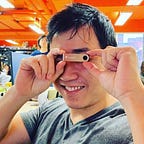Internet of blockchain — a dangerous layman’s analogy
(中文版本請點擊此鏈結。)
Cosmos, Cosmos Hub, internet of blockchains, ForboleChains, interoperability, decentralization, bla bla bla… I know quite some of our stakeholders are layman to not only blockchain but technology as a whole. I want to help our stakeholders to understand what we are doing by using an analogy. To some experts, this is a dangerous analogy but I can’t resist the temptation. I know this cannot explain the concept in full but this is a good attempt.
A blockchain is a nation
Each blockchain is like a “nation” with its own citizens, ideology, economies, politics, strengthens, weaknesses, characteristics, etc. Bitcoin is a “nation”. Ethereum is a “nation”. Cosmos Hub is a “nation”. ForboleChain is a “nation”.
The internet of blockchains is a world of nations
Currently, the communication between these “nations” are not well established. In fact, they cannot communicate directly at all. There are some guys who started a project called “Cosmos”, which is an initiative to build the internet of blockchains, of which the blockchains, or “nations” can communicate directly and efficiently. You may treat this internet of blockchains as a “world” of a lot of nations.
Interoperability is similar to improving border controls
The interoperability between blockchains is like improving the border control mechanism between nations. This will increase the efficiency and decrease the cost of communication between nations (and their citizens).
Validators are congressmen
These “nations” are not ruled by centralized governments or dictators. They adopt a decentralized governance model. Different nations would have different ways to achieve decentralized governance. Most of them would need a congress to run. Validators of a blockchain are similar to the “congressmen” of nations.
Token is passport; Token holder is citizen
Token is like a “passport“. If you hold the tokens (these should be called staking tokens) of a blockchain, you are like a “citizen” of a “nation”. Atom Token is the passport of a “nation” called Cosmos Hub while Desmo Token is that of a “nation” called ForboleChain.
Validators are selected by the token holders, just like congressmen are selected by the citizens. In real politic, citizens select congressmen by voting in an election. In blockchain, token holders select validators by delegating their tokens to the validators. If the candidates have been delegated enough tokens, they will become eligible validators.
Decentralized applications are provinces
A large nation may have various provinces. While different provinces [1] may have their own localized laws and policies according to their own situations, they have to follow the nation’s constitutions. Decentralized applications built on a blockchain are like the “provinces” in a “nation”. In our “nation” called ForboleChain, we will also develop its first “province” called Forbole Referral Network.
Note:
[1] I used “provinces” but not “states” as I didn’t want to confuse with the “state machine” which is often used to describe blockchain.
Why are all these relating to you as a stakeholder of Forbole Project? The main focus of Forbole Project is to build decentralized social networks. By being the token holder of a decentralized social network, you will become a citizen (more precisely, an owner) and vote for how the social network would operate. Imagine, you may vote out Mark Zuckerberg or Sheryl Sandberg of Facebook.
Full decentralization is unrealistic, and would incur some other costs that we would not see in the old centralized world. All we want to achieve is an equilibrium of decentralization, diversity, inclusivity and transparency. We want to minimize the power of central authority and maximize the sense of ownership of users as much as possible.
